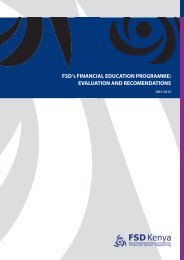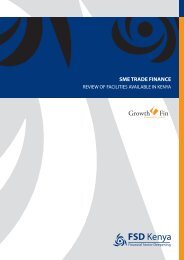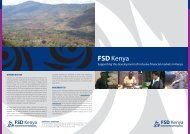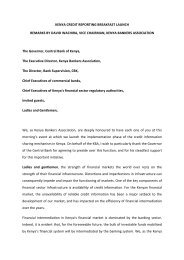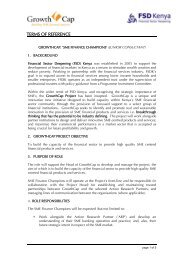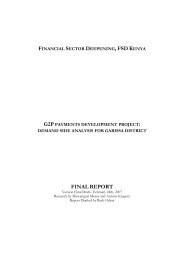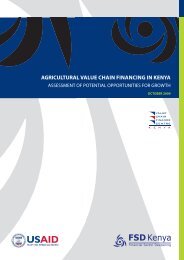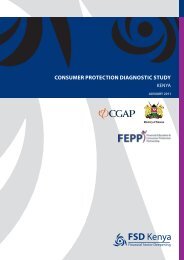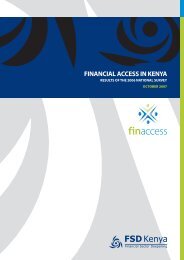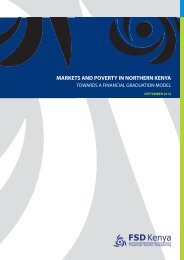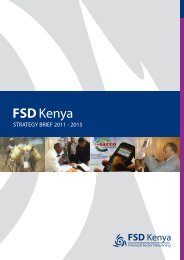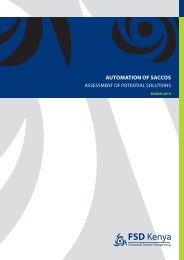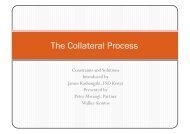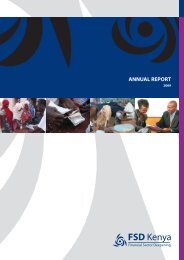MicroSave project completion report - FSD Kenya
MicroSave project completion report - FSD Kenya
MicroSave project completion report - FSD Kenya
Create successful ePaper yourself
Turn your PDF publications into a flip-book with our unique Google optimized e-Paper software.
26 • MICROSAVE PROJECT COMPLETION REPORT<br />
3.2 Evaluate the performance of the Action Research Partner (ARP)<br />
programme, focussing particularly on the extent to which<br />
<strong>MicroSave</strong> has impacted at both a strategic and operational<br />
level on institutions and the resultant. This will require a<br />
detailed review of relevant <strong>report</strong>s and other literature<br />
available, analysis of performance data for ARPs and interviews<br />
with a range of staff within ARPs. Time will not permit detailed<br />
institutional reviews of all ARPs and it will therefore be<br />
necessary to select a limited number of ARPs for more detailed<br />
reviews and draw extensively on existing materials to deepen<br />
the analysis<br />
3.3 Review the relevant toolkits and resources developed for use by<br />
action research partners and the wider global financial sector.<br />
Assess the quality of the material developed, relevance to the<br />
market and examine evidence for impact on both ARPs and the<br />
wider financial sector. This will require use of multiple sources<br />
of evidence – interviewing ARPs and target users of the toolkits<br />
in both financial institutions and business service providers.<br />
3.4 Assess the impact of <strong>MicroSave</strong> work to develop the capacity of<br />
service providers to deliver technical assistance and training<br />
using <strong>MicroSave</strong> toolkits. This will involve examining the<br />
impact of the Young Executive Programme (YEP), training of<br />
senior service providers (SSP) and the certification programme<br />
which <strong>MicroSave</strong> runs.<br />
3.5 Assess the success of the <strong>MicroSave</strong> III <strong>project</strong> against its<br />
defined outputs and objectives, using the attached <strong>FSD</strong> <strong>Kenya</strong><br />
<strong>project</strong> <strong>completion</strong> <strong>report</strong> template (attached at annex 1). This<br />
review would include analysis of effectiveness, efficiency,<br />
relevance and competition. Effectiveness would be analyzed in<br />
the context of doing the 'right' things and comparing outputs<br />
to outcomes. Efficiency would be analyzed in terms of doing<br />
things right in terms of transforming inputs to outputs.<br />
Relevance would be analyzed in the context of competition in<br />
the microfinance sector in the countries of operation, especially<br />
in comparison to other capacity building and consulting<br />
services.<br />
3.6 Review the impact of the <strong>MicroSave</strong> <strong>project</strong> over its three<br />
phases on the development of inclusive financial markets in the<br />
East Africa region and beyond. This should be firmly grounded<br />
within a market development perspective, assessing<br />
<strong>MicroSave</strong>’s contributions but also assessing any weaknesses or<br />
failures in the approach. The aim should be to identify the<br />
lessons for development agencies and others supporting the<br />
development of pro-poor financial markets. Specific issues<br />
which should be examined critically include:<br />
• Overall length of the <strong>project</strong>,<br />
• Levels of subsidy and how these were applied, including<br />
effectiveness and efficiency,<br />
• Selection of <strong>project</strong> partners,<br />
• Approach to sustainability,<br />
• Approach to capacity building, including relevance and<br />
competition,<br />
• Implementation approach.<br />
3.7 Review the current strategy for <strong>MicroSave</strong> Consulting Ltd. This<br />
review should examine the current business plan for <strong>MicroSave</strong><br />
Consulting Ltd and comment on its viability. The review should<br />
examine <strong>MicroSave</strong>’s its current position in the market,<br />
examining where it has a competitive advantage and how it<br />
will need to change as markets evolve. A specific focus should<br />
be on the role of development agencies as clients, either<br />
directly or indirectly and how <strong>MicroSave</strong> is positioned to move<br />
to more commercial relationships with financial institutions<br />
and other market players in the longer term.<br />
Recommendations should be provided to the <strong>MicroSave</strong><br />
management team for ways to enhance the current strategy to<br />
improve market position or profitability. An assessment should<br />
be made of the extent to which the commercialisation strategy<br />
will achieve the development goal of sustaining the impact of<br />
the donor-funded <strong>MicroSave</strong> <strong>project</strong>.<br />
3.8 Review role of the proposed non-profit vehicle and how it<br />
contributes to the overall strategy. A specific issue to be<br />
addressed will be the potential for market distortion from the<br />
continued availability of grant funding. Recommendations<br />
should be made to both <strong>MicroSave</strong> management and potential<br />
donor funders on how this vehicle should be developed in order<br />
to contribute positively to a market development approach.<br />
4. CONDUCT OF THE WORK<br />
A maximum of 20 days is allocated for the assignment. Of this up to<br />
14 days will be spent in the East Africa region. It will be essential to<br />
visit both Uganda and Tanzania in addition to <strong>Kenya</strong>. While<br />
<strong>MicroSave</strong> has also worked with partners in South Africa this has<br />
received much less emphasis in the third phase and can be<br />
satisfactorily covered through telephone interviews.<br />
The reviewer will formally <strong>report</strong> to the <strong>MicroSave</strong> Project<br />
Management Committee (PMC). Progress on implementation will<br />
be monitored by:



